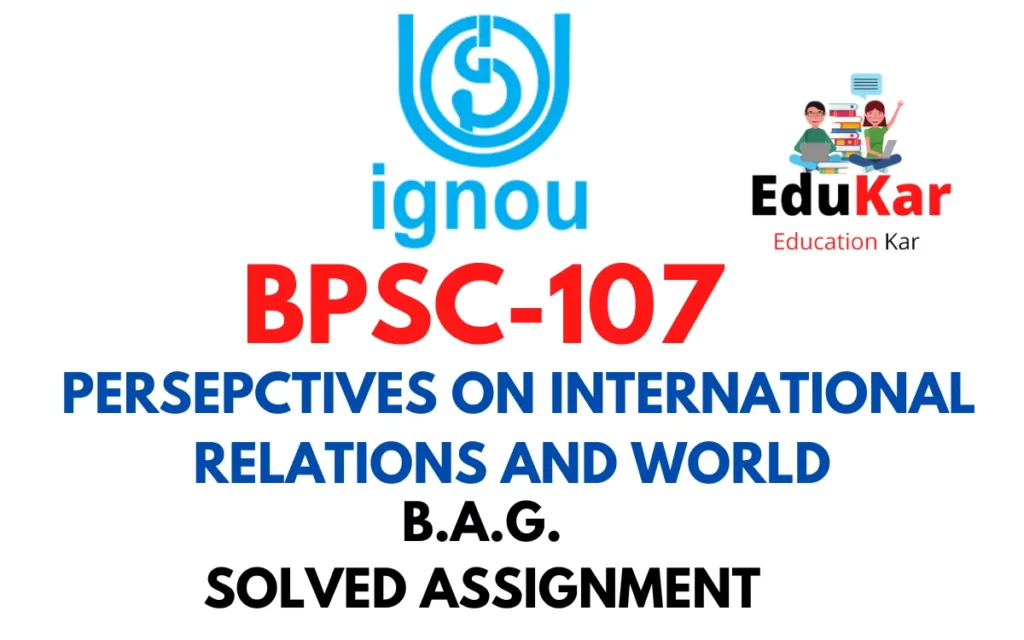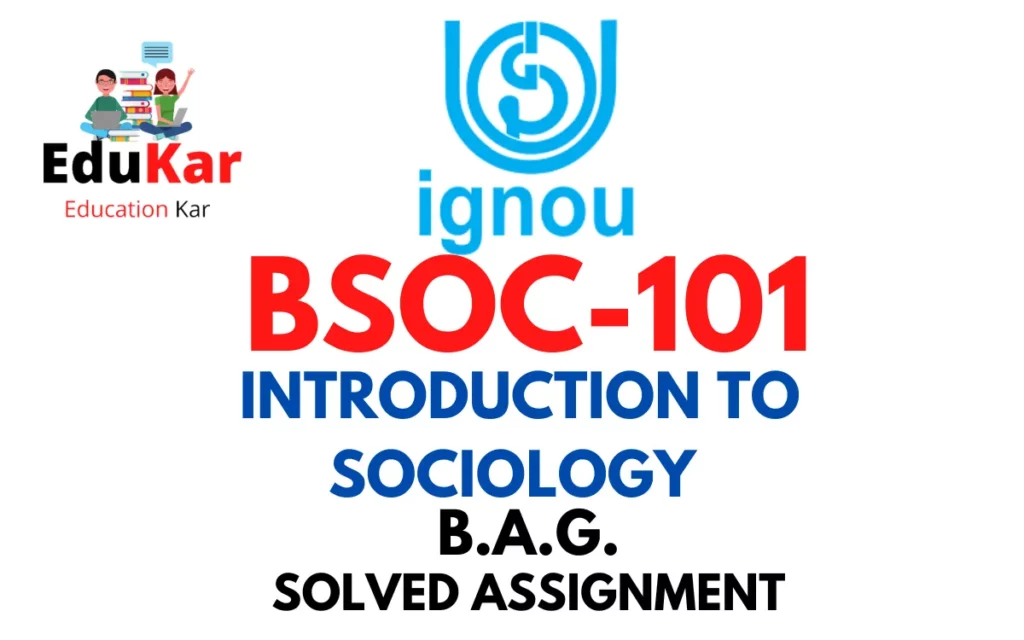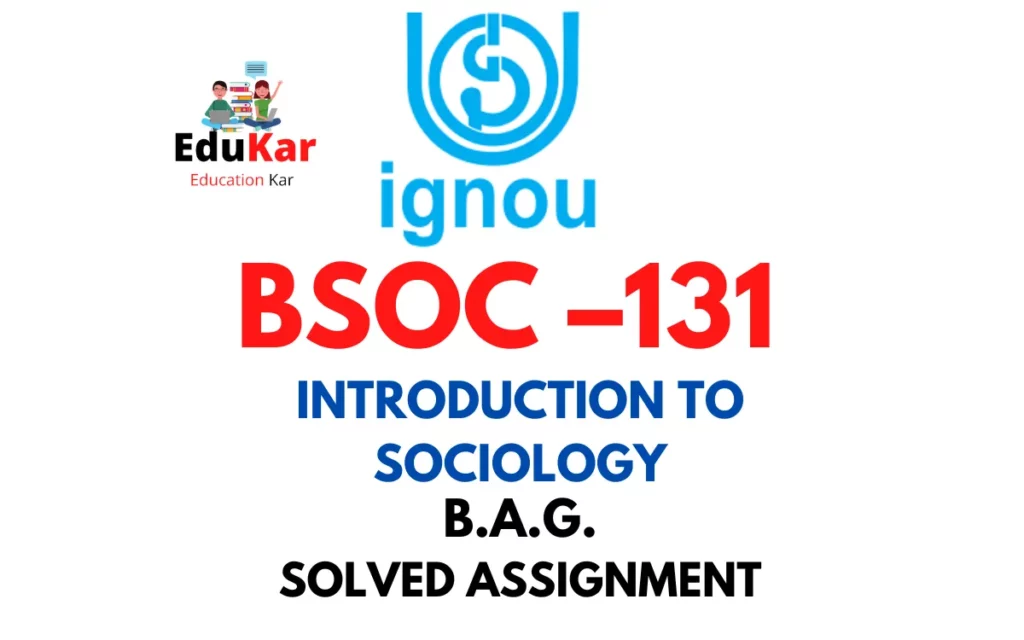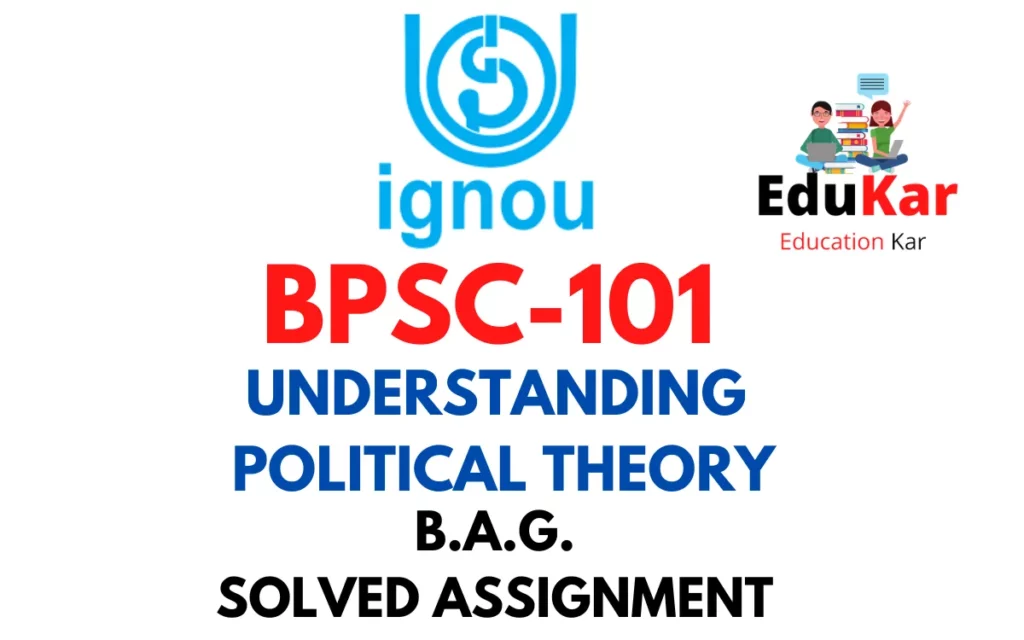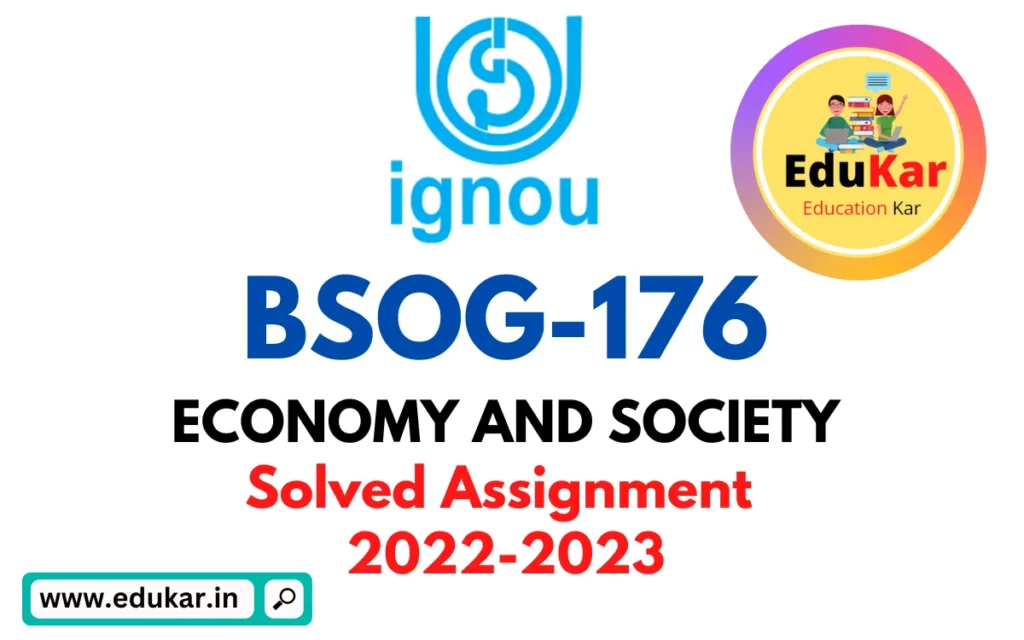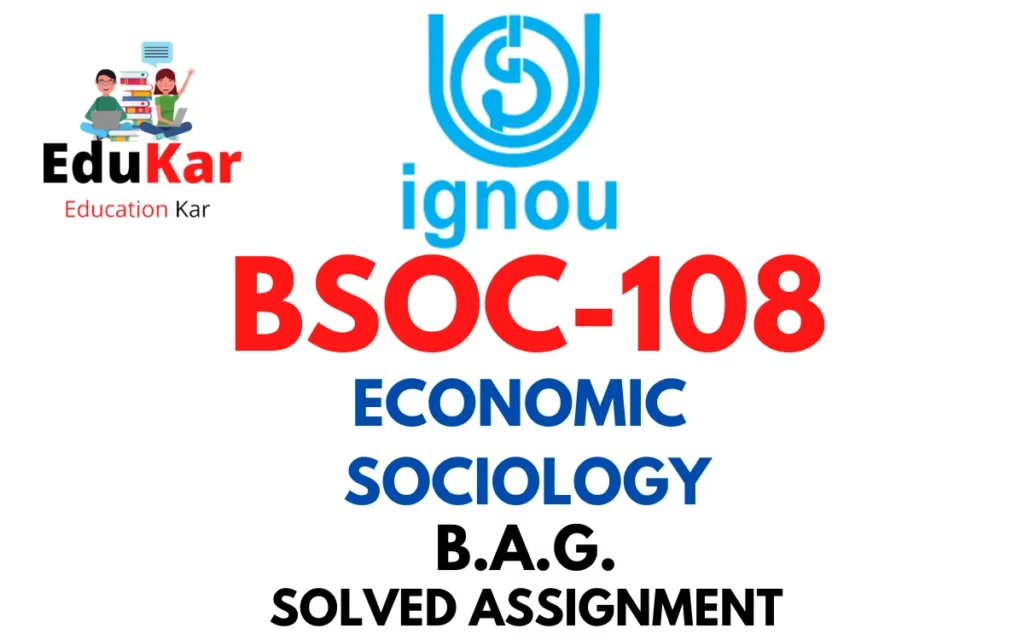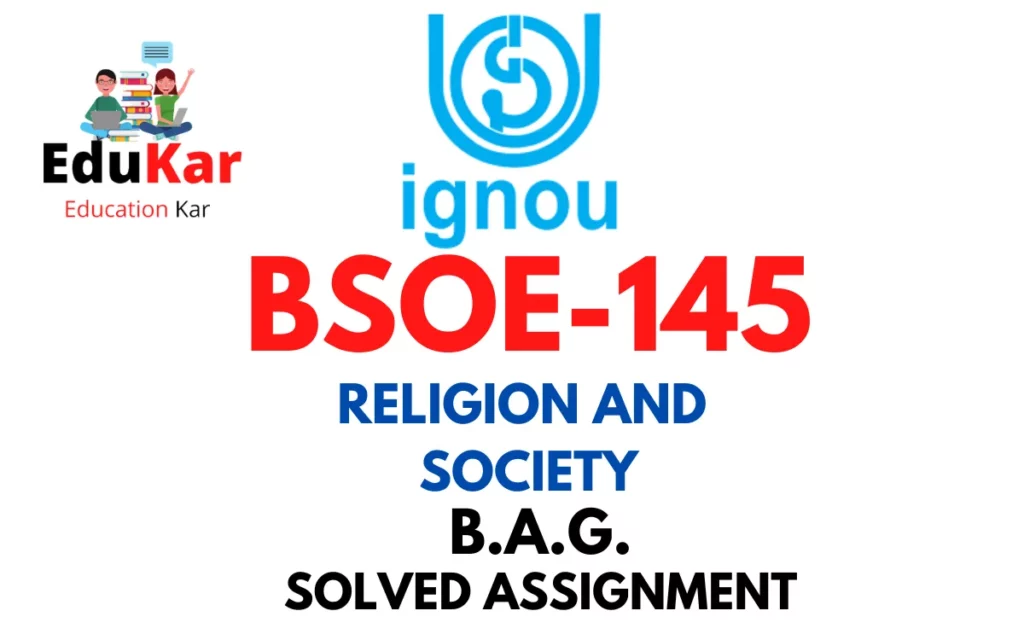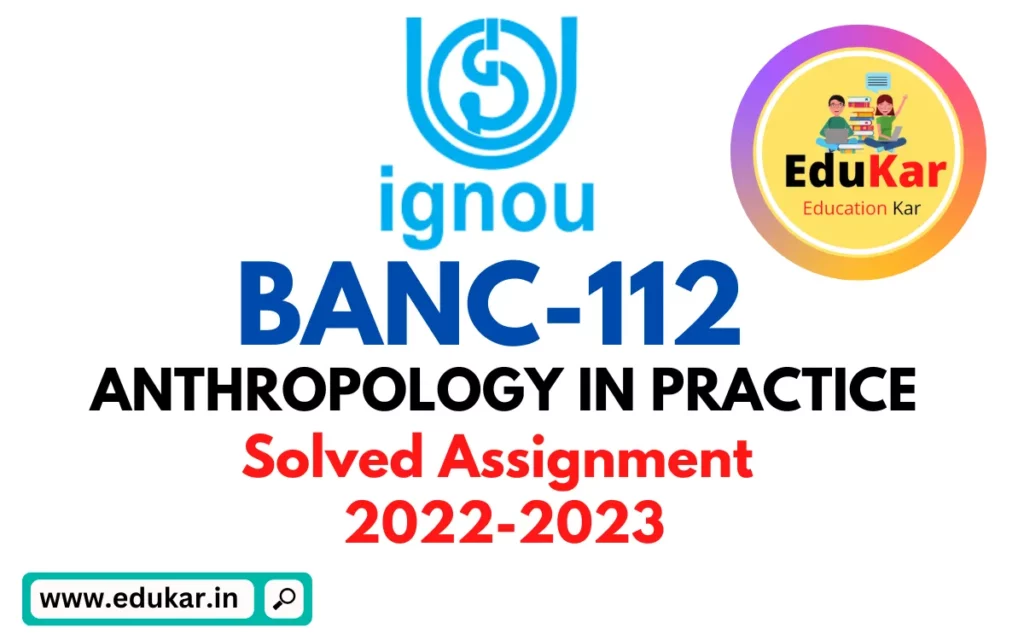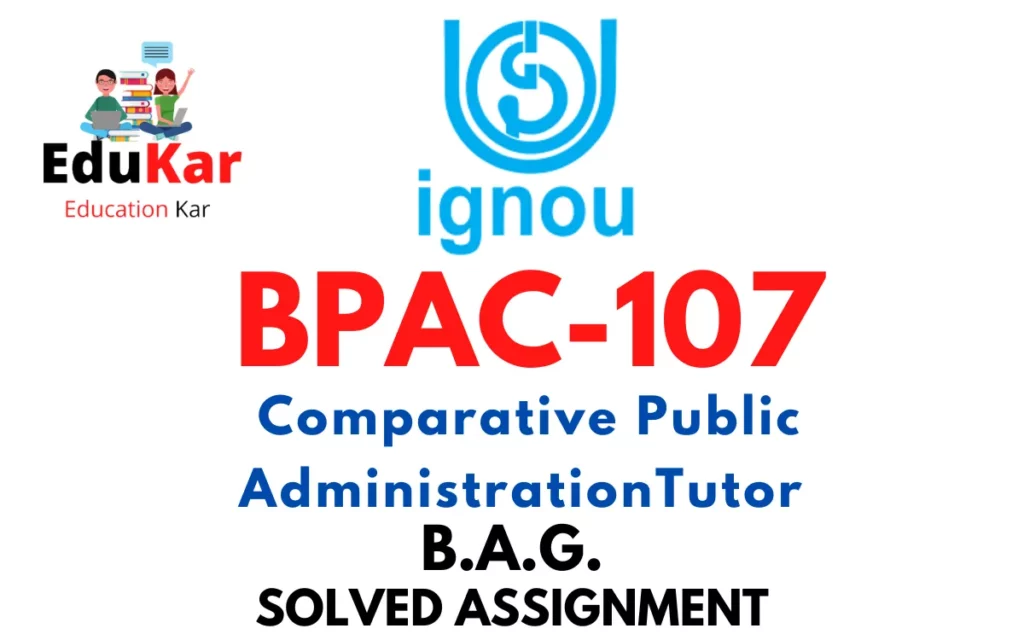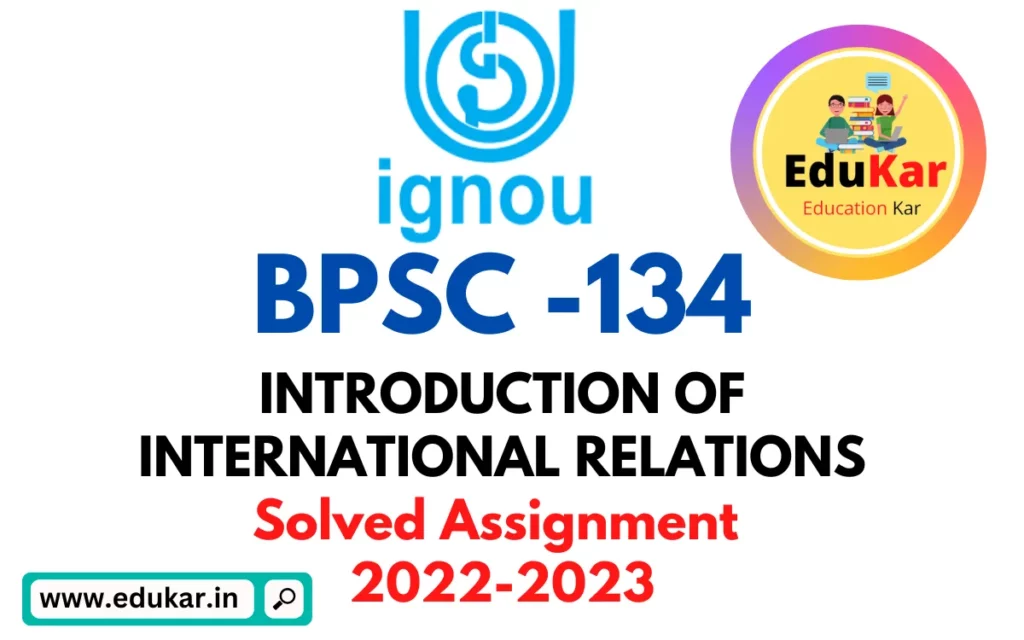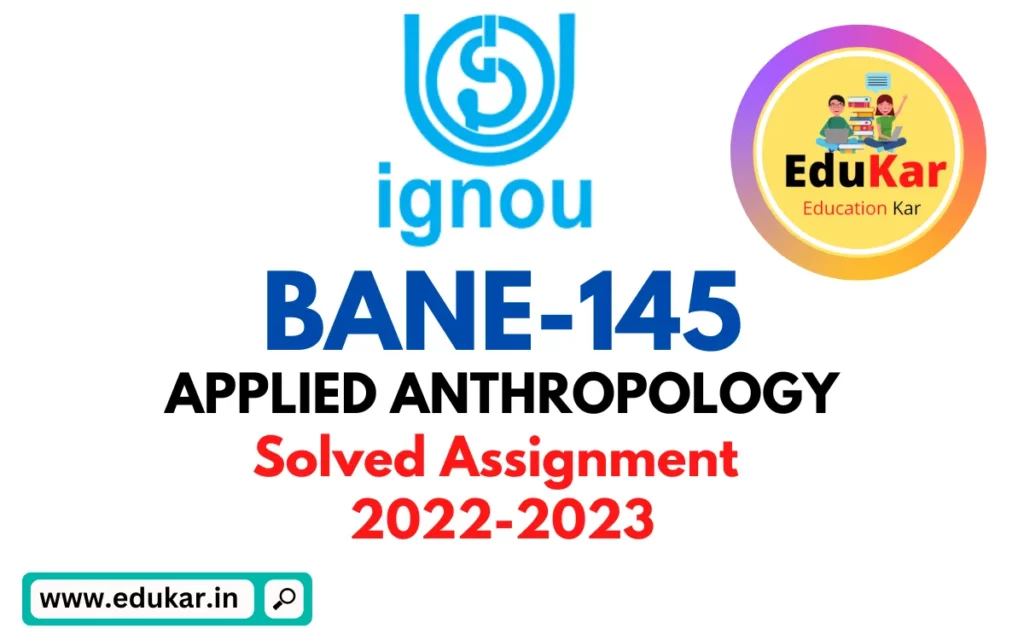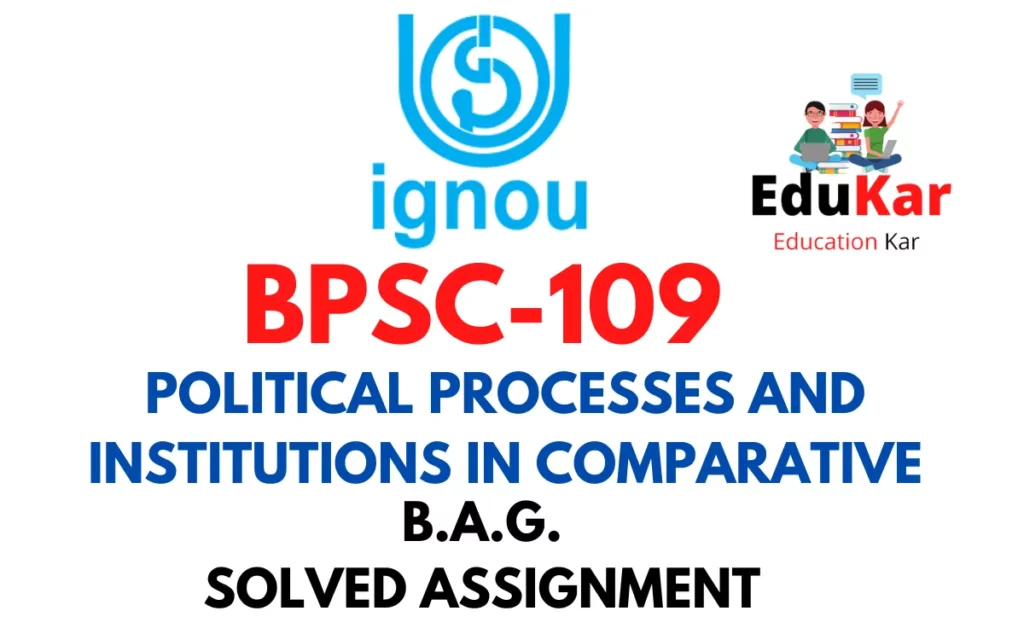Contents
- 1 Assignment-I
- 2 Answer the following in about 500 words each.
- 3 1. Describe the scope of political sociology.
- 4 2. Analyse totalitarian as a form of government.
- 5 Assignment-II
- 6 Answer the following in about 250 words each.
- 7 3. What are the forces which pose a challenge to nation building efforts? Discuss.
- 8 4. Outline the major functions of a political system.
- 9 5. What do you mean by stateless society? Discuss.
- 10 Assignment-III
- 11 Write a note on the following in about 100 words each.
- 12 6. State
- 13 7. Cultural Capital
- 14 8. Traditional action
- 15 9. Neoliberalism
- 16 10. Anomic Interest group
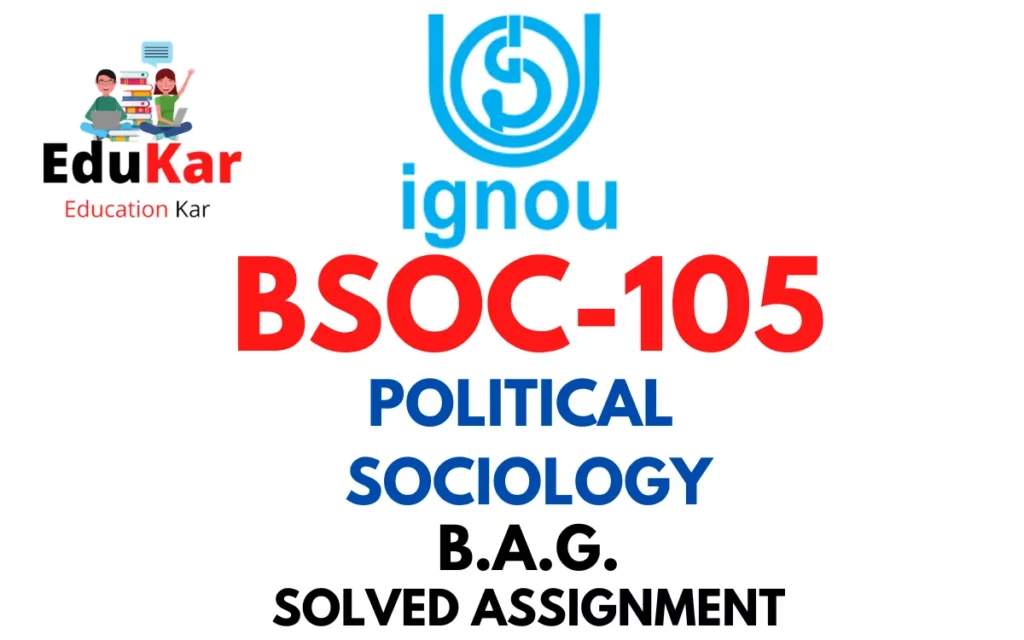
| Title | BSOC-105: IGNOU BAG Solved Assignment 2022-2023 |
| University | IGNOU |
| Degree | Bachelor Degree Programme |
| Course Code | BSOC-105 |
| Course Name | POLITICAL SOCIOLOGY |
| Programme Name | Bachelor of Arts (General) |
| Programme Code | BAG |
| Total Marks | 100 |
| Year | 2022-2023 |
| Language | English |
| Assignment Code | BSOC-105/ASST/TMA/2022-23 |
| Assignment PDF | Click Here |
| Last Date for Submission of Assignment: | For June Examination: 31st April For December Examination: 30th September |
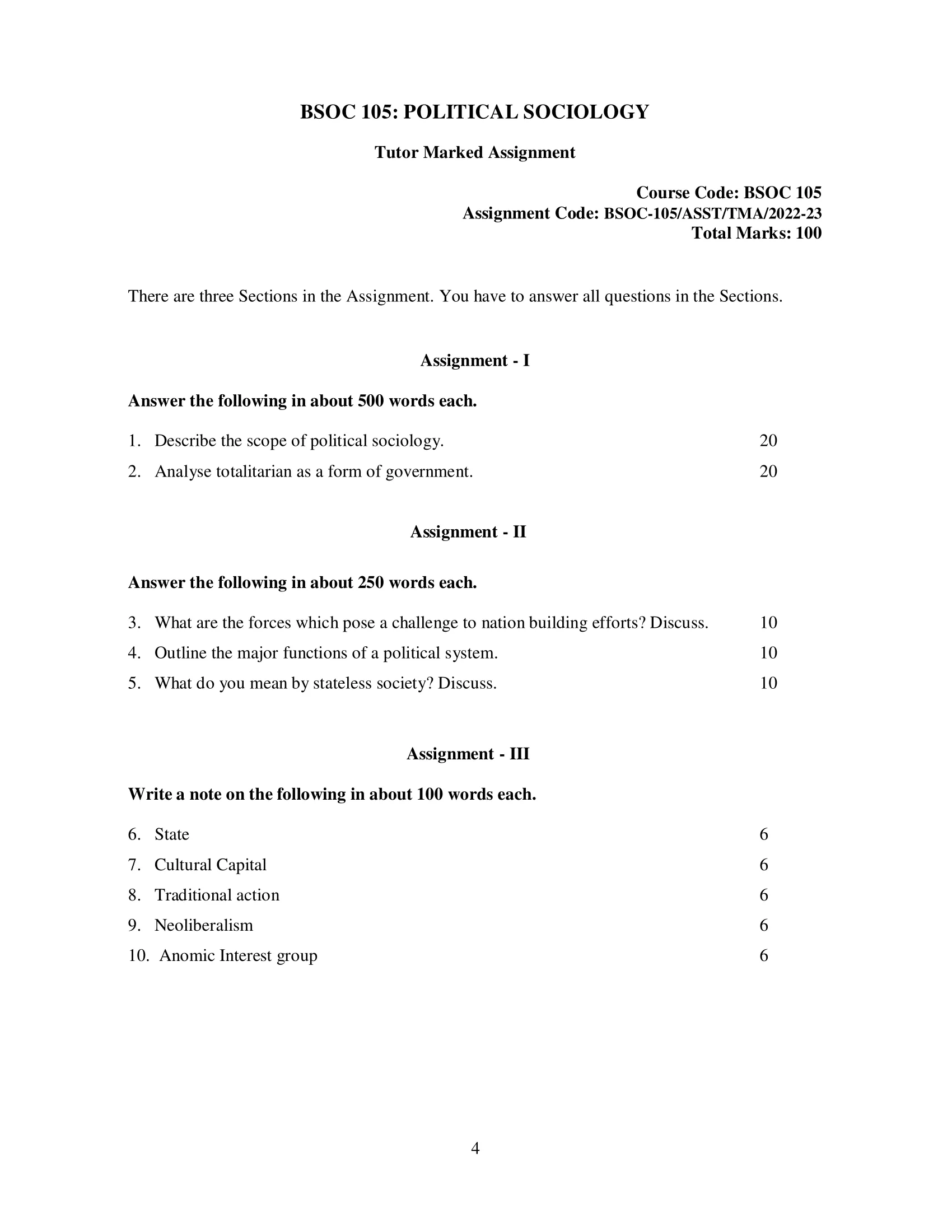
Assignment-I
Answer the following in about 500 words each.
1. Describe the scope of political sociology.
Ans: Political sociology is a subfield of sociology that seeks to understand the relationship between society and politics. It investigates how social structures and social processes impact the formation of political systems, policies, and institutions. Political sociology is concerned with studying the power relations within a society and how these power relations are reflected in political institutions, policies, and social movements.
The scope of political sociology is quite broad, encompassing a wide range of topics and issues. Some of the main areas of focus within political sociology include:
- Political institutions: Political sociology studies the nature and functioning of political institutions such as the government, parliament, courts, and political parties. It investigates the power relations within these institutions and how they influence the formation of policies and laws.
- Social movements: Political sociology also studies social movements, including protest movements, revolutions, and other forms of collective action. It looks at the motivations, goals, and tactics of social movements and how they challenge or reinforce existing power structures.
- Political culture: Political sociology studies the beliefs, values, and attitudes of people in relation to politics. It examines how political culture shapes political behavior, including voting patterns and participation in political activities.
- Globalization: Political sociology studies the impact of globalization on political systems and institutions. It investigates how globalization has transformed the role of the state, the nature of citizenship, and the distribution of power and resources.
- Political economy: Political sociology examines the relationship between politics and the economy. It studies how economic policies and institutions are shaped by political factors and how economic systems, in turn, influence political outcomes.
- Gender and politics: Political sociology also looks at the role of gender in politics. It examines how gender shapes political behavior and how politics, in turn, influences gender relations.
2. Analyse totalitarian as a form of government.
Ans: Totalitarianism is a form of government where the state has complete control over all aspects of society, including political, economic, social, and cultural life. In a totalitarian system, the government often uses propaganda, censorship, and other forms of manipulation to maintain control and suppress dissent.
There are several characteristics of totalitarianism:
- Single-party rule: Totalitarian governments are typically ruled by a single political party that controls all government institutions.
- Centralized control: The government exercises complete control over all aspects of society, including the economy, media, education, and culture.
- Ideology: Totalitarian regimes are usually built around a specific ideology or set of beliefs, which are often enforced through propaganda, indoctrination, and censorship.
- Suppression of dissent: Opposition to the government is not tolerated, and dissent is often met with harsh punishment, including imprisonment, torture, and execution.
- Total control: Totalitarian regimes seek to control all aspects of the lives of their citizens, from their thoughts and beliefs to their behavior and actions.
Historically, totalitarianism has been associated with some of the most oppressive and brutal regimes of the 20th century, such as Nazi Germany under Adolf Hitler, the Soviet Union under Joseph Stalin, and the People’s Republic of China under Mao Zedong. These regimes were responsible for some of the worst atrocities in human history, including genocide, mass murder, and political repression.
Assignment-II
Answer the following in about 250 words each.
3. What are the forces which pose a challenge to nation building efforts? Discuss.
Ans: Nation building is a complex process that involves creating a sense of shared identity and community, promoting national integration, and developing institutions and infrastructure that enable a country to thrive. However, there are several forces that can pose a challenge to nation building efforts. Some of the most significant forces include:
- Ethnic and cultural diversity: Countries with diverse ethnic and cultural groups may face challenges in promoting a sense of shared national identity. Differences in language, religion, and customs can lead to social fragmentation and conflicts.
- Political instability: Instability, including coups, civil unrest, and political polarization, can undermine nation building efforts. Instability can create an environment of mistrust and uncertainty, making it difficult to build effective institutions and infrastructure.
- Economic disparities: Wide economic disparities can create social and economic inequalities that can undermine nation building. These inequalities can create resentment and alienation among marginalized groups, leading to social tensions and conflicts.
- External influences: External forces, including global economic trends and international political dynamics, can also impact nation building efforts. Economic pressures from international trade agreements and political interference from foreign powers can undermine a country’s sovereignty and stability.
To overcome these challenges, nation building efforts must focus on creating inclusive national identities that recognize and celebrate diversity, promoting political stability and economic development, and ensuring that institutions and infrastructure are built with the needs of all citizens in mind. It requires a concerted effort from political leaders, civil society, and citizens to build a strong, unified nation.
4. Outline the major functions of a political system.
Ans: A political system is a set of institutions, processes, and rules that govern how a society is organized and how decisions are made. The major functions of a political system include:
- Creating and enforcing laws: A political system creates laws that govern the behavior of individuals and organizations within society. It provides a framework for enforcing these laws and resolving disputes that arise.
- Providing public goods and services: The government provides public goods and services, such as infrastructure, education, healthcare, and national defense, that are essential for the well-being of society.
- Protecting citizens and maintaining order: A political system provides protection for citizens and maintains order through law enforcement and other security measures.
- Regulating the economy: The government regulates the economy by creating policies that govern trade, taxes, and other economic activities.
- Making decisions on behalf of society: The political system provides a mechanism for making decisions on behalf of society, including decisions related to public policy, national security, and foreign relations.
- Representing citizens and their interests: The political system provides a means for citizens to participate in the decision-making process and have their voices heard. This includes the election of representatives to government and the ability to petition the government for redress of grievances.
- Managing conflicts and resolving disputes: The political system provides a framework for managing conflicts and resolving disputes, both within society and between nations.
5. What do you mean by stateless society? Discuss.
Ans: A stateless society is a society that does not have a centralized government or a state with a monopoly on the use of force. In a stateless society, individuals and communities rely on voluntary cooperation, mutual aid, and collective decision-making to govern their affairs.
Stateless societies have existed throughout human history, particularly among indigenous communities and among some religious groups. In these societies, power is decentralized, and decision-making is distributed among individuals, families, clans, and communities.
In a stateless society, social norms and customs are often used to regulate behavior and resolve conflicts. Disputes may be settled through mediation, arbitration, or other forms of nonviolent resolution. Collective decision-making is often used to address common concerns and promote the common good.
Stateless societies are often characterized by a strong sense of community and a high degree of social cohesion. People in these societies tend to have strong social ties, and social relationships often extend beyond the family unit. In a stateless society, individuals may be more invested in the well-being of the community as a whole and may be more willing to cooperate and work together to address common challenges.
However, stateless societies are not without their challenges. Without a centralized government, there may be a lack of infrastructure, basic services, and public goods. There may also be challenges in enforcing rules and resolving conflicts, particularly in larger and more complex societies.
Assignment-III
Write a note on the following in about 100 words each.
6. State
Ans: The state can be defined as a political entity that exercises sovereign power over a defined geographic area and its inhabitants. It is typically composed of three main elements: a government that exercises political authority, a population that is subject to that authority, and a defined territory within which the government exercises its power. States vary in their size, structure, and level of development, but they all play a key role in shaping the political, economic, and social conditions of their societies. States are responsible for providing public goods and services, enforcing laws and regulations, defending national security, and promoting the welfare of their citizens.
7. Cultural Capital
Ans: Cultural capital refers to the non-financial assets that contribute to a person’s social mobility and success in a given culture or society. These assets include knowledge, skills, education, and other cultural experiences that are valued and recognized within a particular society or community.
Cultural capital is not necessarily something that can be measured in a tangible way, but it can be understood as a kind of social currency that confers certain advantages and privileges to those who possess it. For example, a person who speaks several languages or has a deep understanding of art and literature may be seen as more cultured or sophisticated, and may have better access to certain social and economic opportunities.
Cultural capital is often associated with educational attainment, as formal education is one way that individuals acquire cultural capital. However, it can also be acquired through exposure to different cultural experiences, such as travel, participation in artistic or intellectual pursuits, and other forms of cultural consumption.
8. Traditional action
Ans: “Traditional action” is a concept introduced by the German sociologist Max Weber to describe a particular type of social action that is based on long-standing customs and traditions. According to Weber, traditional action is motivated by a desire to maintain the status quo and preserve established norms and values.
Traditional action is often seen as the opposite of rational action, which is based on calculated, goal-oriented behavior. While traditional action may seem irrational or inefficient from a modern perspective, it can serve important social functions, such as promoting social cohesion and stability within a community.
Examples of traditional action include religious rituals, traditional ceremonies and celebrations, and customary practices that are handed down from generation to generation. In traditional societies, such actions may be the primary way that individuals express their beliefs and values and engage with their community. However, in modern societies, traditional action may be in tension with more rational or individualistic forms of action, which can lead to conflicts or cultural clashes.
9. Neoliberalism
Ans: Neoliberalism is an economic and political ideology that emerged in the late 20th century, primarily in the United States and the United Kingdom. It is based on the principles of free market economics, individualism, and limited government intervention in the economy. Neoliberalism advocates for reducing government regulations and lowering taxes on businesses and wealthy individuals to encourage economic growth and development.
In practice, neoliberal policies have led to the privatization of public services, deregulation of financial markets, and the promotion of free trade and globalization. Proponents of neoliberalism argue that it creates more efficient and competitive markets, which ultimately benefits consumers and society as a whole.
However, critics of neoliberalism argue that it exacerbates economic inequality and social problems. They argue that it promotes a winner-takes-all mentality that benefits the wealthy at the expense of the poor, and that it weakens labor protections and exacerbates environmental problems.
Neoliberalism has been a major force in shaping economic policies around the world, particularly in developing countries. However, its influence has been increasingly challenged in recent years, as many have criticized its emphasis on unfettered markets and limited government intervention in the face of pressing social and environmental challenges.
10. Anomic Interest group
Ans: Anomic interest groups are groups that arise in response to a breakdown of social norms and values, creating a sense of moral ambiguity and uncertainty. Anomic interest groups are characterized by their lack of clear goals and objectives, and they often emerge during times of crisis or social upheaval. These groups can be destructive and violent, as they seek to challenge and disrupt the established order. Examples of anomic interest groups include terrorist organizations, extremist groups, and some forms of organized crime. The rise of anomic interest groups highlights the importance of social cohesion and the need to maintain strong social norms and values in order to prevent the breakdown of social order.
How to Download BSOC-105 Solved Assignment?
You can download it from the www.edukar.in, they have a big database for all the IGNOU solved assignments.
Is the BSOC-105 Solved Assignment Free?
Yes this is absolutely free to download the solved assignment from www.edukar.in
What is the last submission date for BSOC-105 Solved Assignment?
For June Examination: 31st April, For December Examination: 30th October

